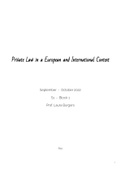Class notes
Private Law in a European and International Context - class and readings summary
- Course
- Institution
Complete class notes for Private Law in a European and International Context, class taken in Sept-Oct 2022 at UvA. Notes include thorough summaries on all reading materials, notes on the tutorials as well as preparatory questions for the exam.
[Show more]




